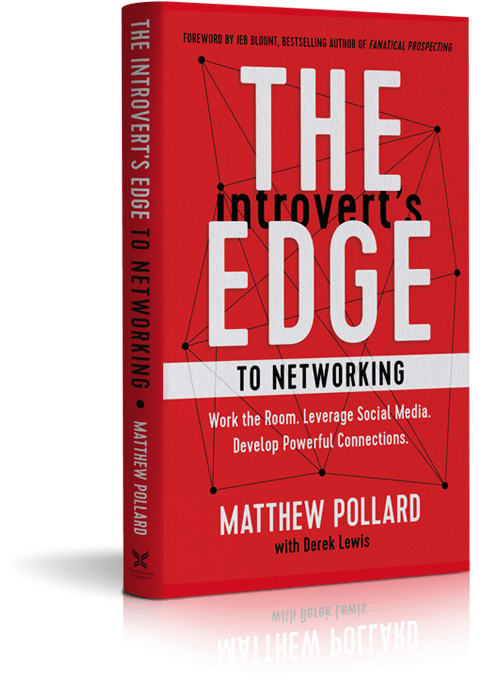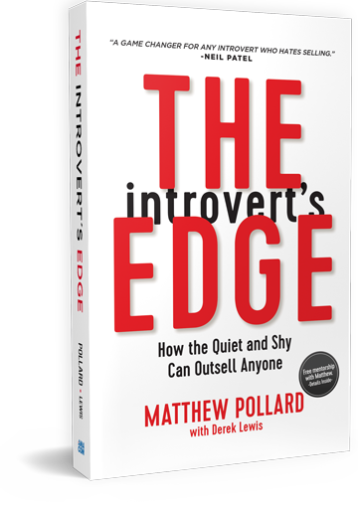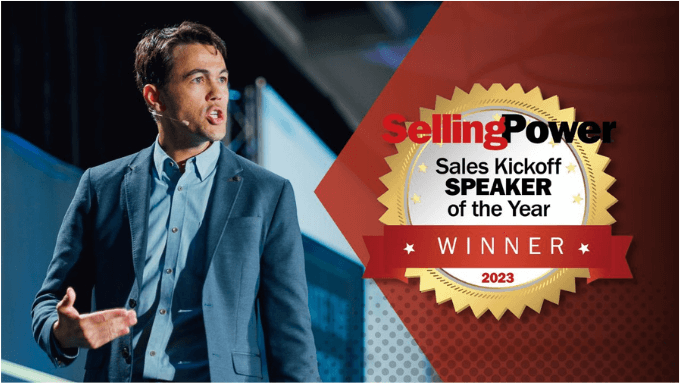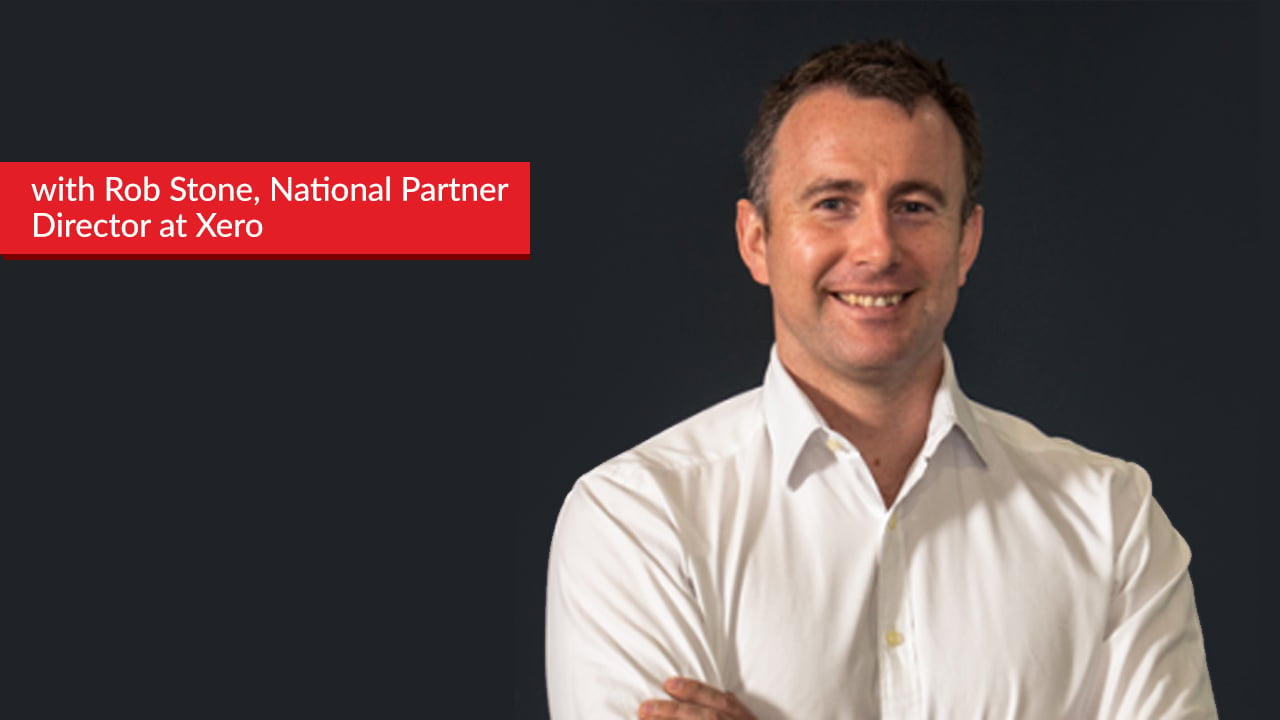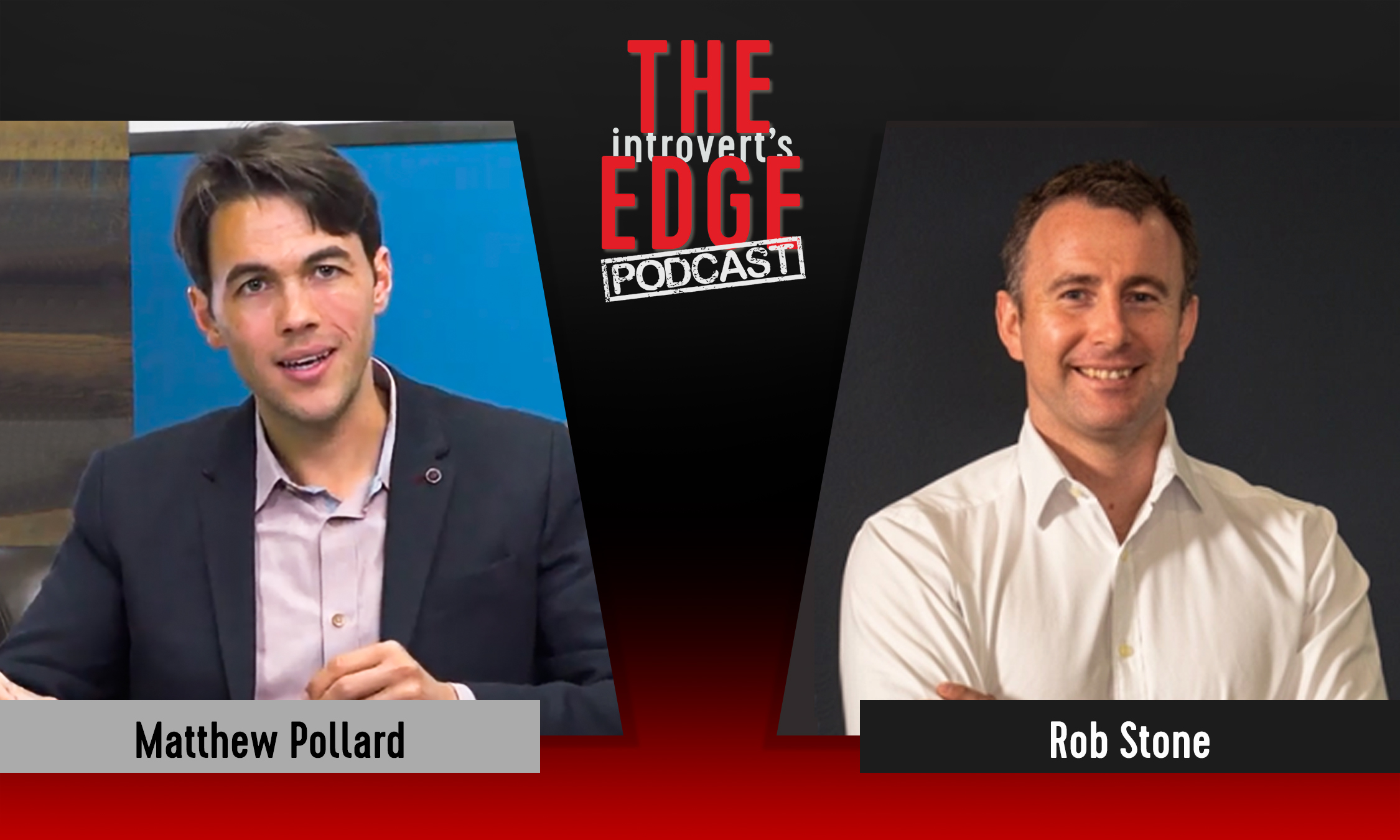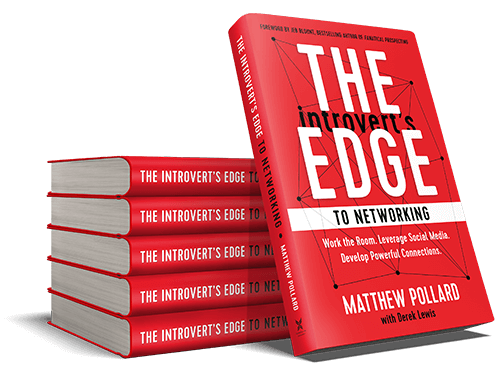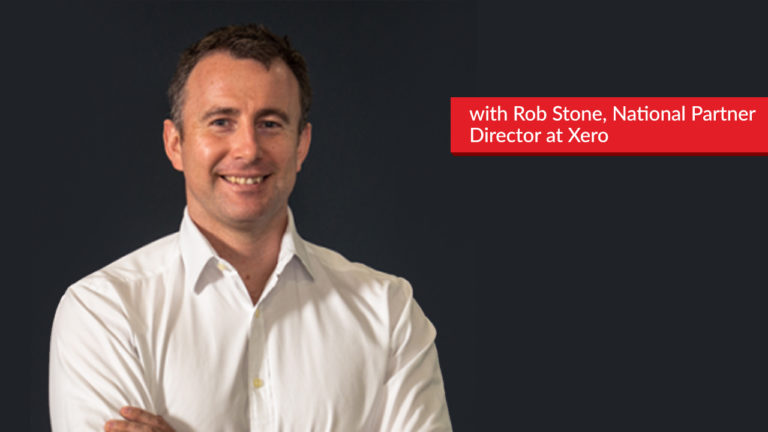Matthew: The Introvert’s Edge Podcast was designed to create a dialogue around introversion. To stimulate a discussion around our disadvantages, how we overcome those disadvantages, and what we consider our introvert’s edge. Together we’re finally going to confront the stigma around introversion, showing that we’re not second class citizens. We’re just different, and we need to embrace that.
Hello everyone and welcome back to The Introvert’s Edge. I’m super excited to welcome back Rob Stone, who is the national partner director for Xero. We’d been having a great conversation about introversion. And we were just talking offline about the fact of being able to talk about these concepts that most people don’t get to talk about.
Rob: Yeah, it’s really nice to do that. As Matt was saying, I was kind of commenting that it’s almost cathartic just talking about this. It is vulnerable. You do feel quite vulnerable talking about the inner workings. But at the same time to actually do it out here in the public domain, it’s like, I’m an introvert and proud of it.
Matthew: Well, I’m glad it’s having that effect. I have to admit, when I came up with the idea of creating this podcast, I did have that kind of thought to myself. I’m going to get introverts that get uncomfortable talking about uncomfortable topics, and I’m going to get them to talk about their most uncomfortable topic, which is their introversion. I wonder how that’s going to go. But I’ve been really ecstatic with seeing how people sort of gravitated to it. And it is, for me it’s cathartic, because I’m getting to talk about it. And I’m also having realizations as I go through about things that you’ve said and how that kind of is something that I do as well. And I’m finding for me, I’m finding it empowering. I’m glad it is for you. And I hope it is for everybody that’s watching and listening along.
So let’s get back to what you kind of hinted to at the end of the last session, Rob, about mindfulness and how you’ve seen that as an impact. I mean, let’s face it, we’re in digital worlds these days, our phone beeps every 30 seconds. I think I’ve had 200 emails since I sat down this morning and I’ve got messages and I’ve got things going on and things are busy. We’ve invented technology to get less busy and it seems to have had the opposite effect. And we now have things going on all the time for introverts that can be quite confronting yet you found a way to take a breath and I’d love you to share that process.
Rob: Yeah, two ways. The first is very structured and formal where you can actually go to a meditation class or a mindfulness class. I’m seeing more and more studios in CBDs popping up where people can go at lunchtime and take 15 minutes, half an hour out of their busy schedules to do that.
And then the other one is what I like to call between the first and second space. So the third space on your way home. Which I’m actually pinching that phrase from Dr. Adam Fraser here in Australia, but that’s where you need to find, pause and break your work headspace from your family or home headspace. And that could be when you’re on the bus, on the train, when you get home for five minutes, just pausing and resetting. We do not have the luxury these days of a work/life balance. We have work/life integration. It is so porous with our digital devices. Now if you’re not conscious about carving out your own time, and let’s face it, playing to our strengths as introverts where we do like to be by ourselves to recharge our batteries. I think it’s on us to actually own that and find that space to have a bit of time to just have mindfulness.
Matthew: I think it’s a really important thing to share. And for the listeners that aren’t from Australia, CBD is “central business district”, or people that are from the city. Us Australians use a lot of slang. And I said CBD for about a year before I realized that no one actually knew what I meant here. So somebody actually put their hand up in the Q&A when I was on stage and said, what exactly is this CBD thing? But it’s super important for all introverts to still have their recharge time. And I know that Jamie Masters, another guest that we’ve had on the show, is a big component of that. She finds it gives her that ability to recharge. She’ll run a three-day event and sleep just doesn’t cut it. She has to have that time for herself and this is time you’ve got to take away from your family or your career. How do you structure that in your mindset so that it’s okay to take that time for you?
Rob: I think it comes down to one, you have to recognize first off that you need it and that’s okay. You know, I actually think it’s not something that we necessarily have the option over. It’s part of our makeup. And that means that we need to be really effective when it comes to communicating, particularly to your loved ones at home, but then also at work. We’re not robots, we’re all humans. And it’s basically saying I need this to recharge. And when I do, I operate at a far higher level.
Matthew: Richard Branson goes to the gym two or three times a day. And that’s a lot of time. People are like, how can you spend so much time doing that? He said, because I’m three times as effective the rest of the time because I do that for me. When I’m stuck in something, I’ll go for a run and the idea appears. And it’s always, why am I stressing about that? Like, just chill out. And it’s not that important. Then sometimes we just need the oxygen that comes with that timeout to tell us what we probably already know.
Rob: And oxygen is a really good fundamental point. I mean, breathing in mindfulness exercise is important, but you can equally get a huge intake, obviously, when you’re going to do exercise. And that’s something that I need to do a lot more.
Matthew: It’s something that I think we all need these days in our demanding worlds. I mean, just doing these segments, I have to keep reminding myself that I don’t need to speak at a million miles an hour and I can breathe. And everybody is okay to wait while I take a breath, it’s not that long a period of time.
Now, Rob, I want to segue because you went from sales to leadership and a lot of people fail at that change because what makes a successful salesperson, definitely a lot of the time doesn’t make a successful leader. And I think that, and I don’t want to project on you, but I think that some of your introvert qualities probably played a big factor in that. But I’d love for you to talk about that transition and the barriers you had to leadership, and some of the success factors that introversion may have caused.
Rob: Yeah. Yeah. Well, first off being a technician or a high-performing individual contributor, most times it is very hard to segue into a people manager role. I think in this instance Xero’s very unique in the sense that it’s not a typical sales organization. It is a very, very much a purpose led company. So the wider aspect is we want to help millions of small businesses around the world grow, create more jobs, get paid faster, access to capital. In Australia we’ve got 2.1 million small businesses, and they are primarily being helped by the accounts of bookkeepers. 31,000 partners who are out there advising other small businesses. And that’s my focus, is these accountants and bookkeepers. And I’ve been very fortunate to be involved with them for the last four years. And we know that if we can help them, they in turn will help the small businesses inside Australia.
And so when I moved into the sales role, I was obviously quite skeptical. I hadn’t had any exposure to what a sales role was. And I was very relieved to find that the sales concept or process inside Xero isn’t an old school sales model. It is very much you have mindsets of people, some are closed, so we’re moving along a journey to be open, but it’s all about collaboration. And I do think that we’re seeing a huge change in the sales psychology globally, where it is all about collaboration. If you’re not out there genuinely trying to help the people that you’re talking to day in, day out, you will fail. And that’s not because there’s an increasing number of places where you can get information so you have the most informed buying set forever in history. But it’s a long-term engagement. That’s what I’m saying to realize.
And Xero really supports that, so that was a nice match for who I am. Because I physically am not able to go out there and do a hard sell. Even if I did over a repeatable process, I would struggle with that. So this really kind of married up with who I am. I love the idea of helping small businesses. I love the idea of helping the advisors of small businesses, so that process made it very easy for me to kind of move into this sales role inside Xero.
But then when we moved, when I had the opportunity to move into a people management role, that was easily the hardest inflection point in the entire career to date for many reasons. First and foremost though is, I was stepping up amongst my peers to say I’m now here to help you. And the way that I made that transition was to adopt a servant leadership mindset where I was there to very much help all these amazing account managers as much as I could. And that really made it a kind of smoother transition.
A year later I moved into the national partner role where I’m now looking after 15,000 partners in Australia, a team of 65 in Australia. And I’m managing managers and the skillset had to transform again into I guess being a very effective communicator. You have to be very purpose driven and authentic. And one thing that I’ve learned more than anything else within both these two last iterations of the roles is this concept of listening, which is a great strength of introverts. And it’s probably one of the things that I’ve leveraged the most. And listening isn’t just the top level, top line, it’s actually listening three layers below. So often when people are emotional or there’s issues or they’re not feeling like they can do the best work of their lives, that’s when the introvert really comes to the fore, when you can get down and listen to what’s the driving motivator behind what could be you know almost a veneer, like a symptom and an aspect of the underlying cause.
Matthew: That’s really valuable Rob, because what you’re saying is that like an extrovert in a leadership role would go straight into talking at the problem, what you’re saying is you take the time to really listen and work out what the underlying cause is and reflect on that, and then come back to them with an answer. And that is a real strength that introverts have over the extroverts. Because we’re not trying to talk at the problem, we’re trying to understand the problem.
Rob: Yeah, 110%. And being a good people manager is one of, I think, the hardest things you can ever do in your life. It’s really hard. It’s really challenging. It’s completely inconsistent every day. But it’s also one of the most rewarding things you can ever do in your life. And I never thought I would be good at it. I never thought I would be interested in doing it. But having been in a couple of roles where I have had the opportunity to manage people, it is incredibly rewarding. I think most people are heliotropic in the sense that they respond more to the positive. So similar to sunflowers that follow the sunlight around, people are very similar. You have to give them the positive energy when they walk through the office into the office and show that they can be incredibly positive in their own internal monologues. And also show that you don’t get the best out of people by hitting them, beating them with a stick and focusing on the negatives. You really have to focus on the positives and show what they’re doing right, and trying to get them to do more of that. I think that’s the best way that you can help people do the best work of their lives.
Matthew: So just to make sure I’m translating this into words, I understand it’s, it’s really stepping back, not micromanaging them. Giving them that empowerment to do their own thing, but also taking responsibility for their excitement and their attitude in the workplace.
Rob: Giving autonomy and ownership is the most powerful thing you can do to anyone. It actually dignifies the individual as saying, “Hey, you are running a business within a business. These are the tools that you have. This is the opportunity or the landscape that you can operate in, go forth and, and make it yours and treat it like your own business.” It’s so, so empowering. There are always going to be guardrails within a business, and then you have to narrow those guardrails where appropriate. But that ownership combined with a really strong sense of purpose is incredibly powerful.
Matthew: Let’s focus, Rob, just for a second on the transition from being a staff member like everybody else, to the management role now in charge of managing the staff. And you took the role of how do I serve you now? A lot of people will also take it from, I now have to become a dictator, I’ve got to tell people what to do. But talk to me through the mindsets that you went through at that point, because you weren’t trained as a leader. And a lot of times people are thrown into this and become dictatorial. I know I did when I first started and it was a massive pitfall when I first started that I was proud of because I was being like the manager that I had in the past. But it wasn’t the right way to go about it. And I’d just love you to talk through that so people don’t have to make the mistakes that I made.
Rob: Yeah. Well, a couple of things first off. Someone who has never had a bad manager is incredibly lucky in this life. I haven’t been that lucky. I had one bad manager in a corporate finance role and strangely enough, that was one of the biggest positives in my life because I can now take all those mistakes that I’ve seen so I don’t want to repeat that. The key one being micromanaging, giving that sense of autonomy. And then the other aspect is empathy. You know, the fact that you can mentally walk a mile in someone else’s shoes, that is a big strength of being an introvert. I really believe that’s incredibly powerful as well, because then all of a sudden your actions, if you can see the consequences of them in someone else and how they’re going to react to that, really sets up the course that you take during the day.
Matthew: We’re always learning as introverts. And we were talking offline about your next step, which is to become more of a public figure and to speak more and do more of these interviews and those sorts of things. And you’ve started that process. Now I’d love just to sort of share some of the things that you’re consuming right now, because I think people look at people that are successful as introverts and assume that it came to them naturally, that it wasn’t a thing they focused on learning. So you’re now going through a new process of learning and doing something differently. I’d love to hear how you’re taking that so that you don’t fail, but you see you set yourself up for success.
Rob: Well, first off practice. Just get out there and just do the actions. Do the doing, don’t overthink it. We did a great diversity and inclusion course the other day and it was fascinating. Because when we were moving through that, I was thinking how that applies to being an introvert versus in an extrovert’s world. And diversity and inclusion, the best way to describe that is being invited to a party, but no one inviting you to dance when you’re at the party. So the concept of all of us being unique and actually celebrating it and not being afraid of that uniqueness. Which means fundamentally you have to be a little bit vulnerable to share a little bit about yourself. And I think that process where we are now in a society where we can celebrate uniqueness is a fantastic thing.
And it doesn’t matter what it is. I think it’s generally accepted that we do live in a world that celebrates the extrovert. And you know, what we’re doing here with this podcast is a great example of maybe trying to rebalance that a little bit and celebrate the introverts. It would be a fascinating concept to say, what if we all lived in an introverted world where the introverts were celebrated and maybe the extroverts were the minority. How would that play out? I don’t know, but I suspect the thing is you just celebrate the fact that you are unique and you play to those strengths. No one is perfect. Recognizing that, and then the first step along all this as a bit of awareness. And I can even hear myself now, I’m not breathing and it’s like, I need to take a big breath.
Matthew: Well, look, I think that that’s fantastic and Rob you’ve provided amazing value today. So I really appreciate that.
Rob: Thank you. And thank you for the opportunity. It’s really great to talk about this and I’ve read the book and it is fantastic. I’d recommend it to anyone who’s an introvert.
Matthew: Well I appreciate you sharing that. And Rob, I want to ask you the one question that I ask everybody at the end of each one of these sessions, which is, you’ve got a lot of skills and a lot of talents, but if you could pick one that you would consider your introvert’s edge, what would it be?
Rob: I would say storytelling more than anything else. And it’s not necessarily my ability to storytell because I have never been able to tell a good story to a dinner party, but it’s my ability to digest stories. I love writing stories and I think the more that you can read and listen to other people’s stories, that will give you a greater sense of empathy. And when you have empathy, I think that’s when you’re really set up for success.
Matthew: That’s fantastic. Well, Rob, it’s been an absolute pleasure having you on the show and you’ve just given such amazing value to all the listeners. So thank you again for being on and just giving so much value.
Rob: Thanks, Matt.
Matthew: And for everybody that’s watching at home, if you want to check out some more of the show notes that are there on the page, please go to theintrovertsedge.com/rob. If you want to check out The Introvert’s Edge book, feel free to go to theintrovertsedge.com and you’ll be able to download a free chapter there. But more than that, I would really appreciate you helping share this message and help us start to remove that stigma that we know is there around introversion by sharing this content by subscribing to the podcast, so you get more great value. And also writing a review to bring it higher in the charts so more introverts see this content and start to develop and learn strategies to be more successful in their businesses and in their lives. Until next time, thank you so much for joining us and I’ll look forward to seeing you in the next episode. Cheers.







